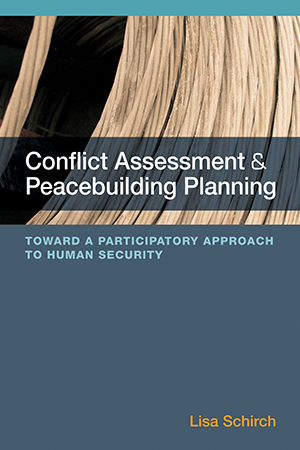Conflict Assessment and Peacebuilding Planning:
Toward a Participatory Approach to Human Security
Lisa Schirch
A Global Observatory Must-Read Book in Peace and Security!
Offering a systematic approach that links practical conflict-assessment exercises to the design, planning, monitoring, and evaluation of peacebuilding efforts, Conflict Assessment and Peacebuilding Planning has been carefully—and realistically—designed to enhance the effectiveness of peacebuilding practice.
Lisa Schirch presents a convenient, logical framework and a wealth of tools for improving planning and implementation. She also helps us to fruitfully question widely held assumptions. Her concise handbook, informed by on-the-ground realities, is an essential resource for building true human security.
Lisa Schirch is professor in the Keough School of Global Affairs at the University of Notre Dame. Her publications include The Little Book of Strategic Peacebuilding, Civilian Peacekeeping: Reducing Violence and Making Space for Democracy, and Ritual and Symbol in Peacebuilding.
No rights in India."Comprehensive, yet strategic in approach, the result of years of practice, this is a clear and systematic overview with practical and appropriate steps for assessment and planning."—John Paul Lederach, University of Notre Dame
"A gift for professors and students. Schirch takes a complex, steadily evolving, and acronym-heavy field and makes it intelligible to just about any student."—David Matz, University of Massachusetts, Boston
"Schirch provides a wonderful range of analytical tools for peace practitioners from government, international agencies, and the NGO world."—Peter Woodrow, CDA Collaborative Learning Project
"The heart and soul of peacebuilding, wrapped into a clear, lucid, accessible package." —Melanie Greenberg, Alliance for Peacebuilding
"From research design to theories of change, implementation, and evaluation, this book will support more effective peacebuilding."—Andy Carl, Conciliation Resources, and Paul Murphy, Saferworld
"A great resource for institutions large and small considering how we move from analysis to planning." —Alys Wilman, World Bank
"The response to peacebuilding has to be informed by local realities, with people being central in the quest for peace. This book is a valuable resource that points us in that direction."—Florence Mpaayei, Nairobi Peace Initiative
"A great resource for practitioners working in conflict-affected areas."—Mirwais Wardak, Peace Training and Resource Organization Afghanistan
"Chock full of common sense, practical, and field-tested ideas for improving the way that we understand and engage conflicts. Reading it will help peacebuilding practitioners strengthen the critical yet frequent tenuous linkage between assessment and program planning."—Lawrence Woocher, USAID
"Schirch offers us a systematic, reflective way of developing strategic peacebuilding interventions that recognize the centrality of people…. [Her book] encourages us to develop broader peacebuilding partnerships that stand a greater chance of being sustainable and having a cumulative impact. It is a must have for peace practitioners."—Koenraad Van Brabant, InterPeace
- The Purpose of this Handbook.
- Research Methods and Challenges.
- Self-Assessment.
- Conflict Assessment.
- Where: Understanding the Conflict Context.
- Who: Identifying Stakeholders and Potential Peacebuilders.
- Why: Motivations.
- What: Systems Mapping of Conflict Drivers and Mitigators.
- How: Sources and Uses of Power.
- When: Timelines, Triggers, Windows.
- Theories of Change for Peacebuilding.
- Peacebuilding Planning Guidance.
- Monitoring and Evaluation.
- Appendixes: Writing a Conflict Assessment and Peacebuilding Planning "Learning Document."
- Recommendations for Coordination and Donors.






